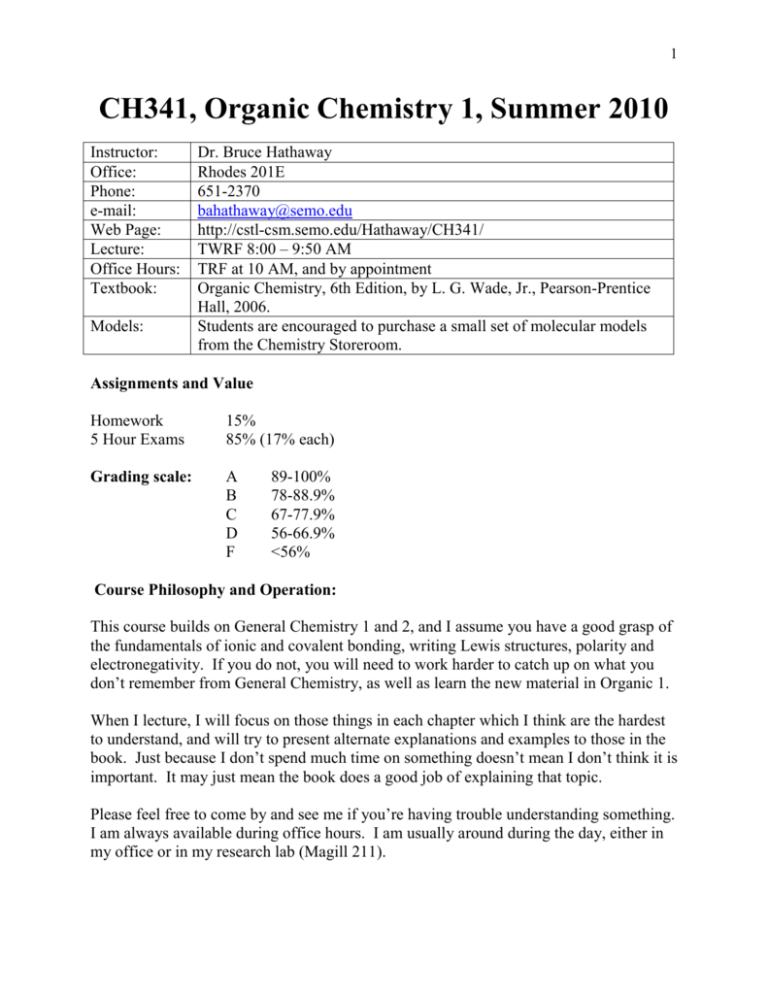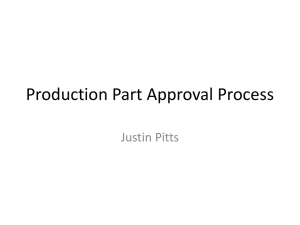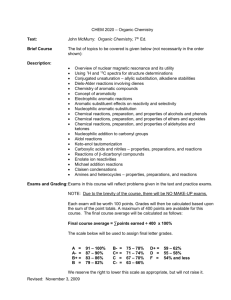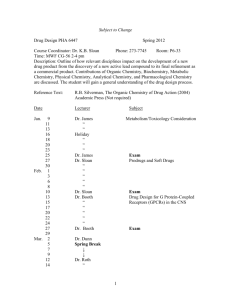
1
CH341, Organic Chemistry 1, Summer 2010
Instructor:
Office:
Phone:
e-mail:
Web Page:
Lecture:
Office Hours:
Textbook:
Models:
Dr. Bruce Hathaway
Rhodes 201E
651-2370
bahathaway@semo.edu
http://cstl-csm.semo.edu/Hathaway/CH341/
TWRF 8:00 – 9:50 AM
TRF at 10 AM, and by appointment
Organic Chemistry, 6th Edition, by L. G. Wade, Jr., Pearson-Prentice
Hall, 2006.
Students are encouraged to purchase a small set of molecular models
from the Chemistry Storeroom.
Assignments and Value
Homework
5 Hour Exams
15%
85% (17% each)
Grading scale:
A
B
C
D
F
89-100%
78-88.9%
67-77.9%
56-66.9%
<56%
Course Philosophy and Operation:
This course builds on General Chemistry 1 and 2, and I assume you have a good grasp of
the fundamentals of ionic and covalent bonding, writing Lewis structures, polarity and
electronegativity. If you do not, you will need to work harder to catch up on what you
don’t remember from General Chemistry, as well as learn the new material in Organic 1.
When I lecture, I will focus on those things in each chapter which I think are the hardest
to understand, and will try to present alternate explanations and examples to those in the
book. Just because I don’t spend much time on something doesn’t mean I don’t think it is
important. It may just mean the book does a good job of explaining that topic.
Please feel free to come by and see me if you’re having trouble understanding something.
I am always available during office hours. I am usually around during the day, either in
my office or in my research lab (Magill 211).
2
Homework:
The main goal of homework is to help you learn. Homework will be
assigned and collected regularly. Late homework will be penalized 20%
if it is turned before the next class day after the due date, and is not
accepted after that.
Exams:
There will be five in-class examinations on the dates indicated in the
schedule. Since the subject is cumulative, you will need to remember
previous material to do well on each exam. If you have to miss an exam
for some legitimate reason, you must contact me beforehand, if at all
possible, and I will arrange for a make-up exam. Your excused absence
will have to be substantiated in order for you to make up the exam.
PowerPoints: PowerPoints will be posted as they are written. The PowerPoints are not a
substitute for the book, but an adjunct. I try to put most of the important
things in them, and some alternate explanations to what the book says in
them, I can’t cover everything in the book in the PowerPoints. I may
choose to not cover something if the book does a good job with it.
Study Hints:
Organic Chemistry is cumulative. You have to keep up with the material. It is helpful to
read the chapters before I lecture on them, just to get familiar with the vocabulary.
Review your lecture notes as soon as possible after lecture to make sure they make sense.
Read through the chapter again, working problems as you go. THE BEST WAY TO
LEARN ORGANIC CHEMISTRY IS TO WORK PROBLEMS! When you have
finished reading through the chapter, work as many of the end-of chapter problems as
you can.
Studying in groups can be helpful, as long as everybody contributes something. If
someone merely comes to get the right answers to homework problems, it won’t help
them on an exam. If your study group meets regularly to work problems, let me know,
and I may stop by to see how you’re doing.
Academic Honesty
I do not tolerate academic dishonesty in my classes. This includes, for example, cheating
in any form on an exam, giving information to another student about an exam, seeking to
obtain information from another student about an exam, and using another’s work, and
claiming it to be your own. Each instance of academic dishonesty will receive a grade of
ZERO. See the academic honesty policy in the Undergraduate Bulletin for more details.
3
The One-Time-Only Exam-Reworking Option to Earn Points on One Hour Exam.
You may elect to rework any or all of the problems you missed on one hour exam this
semester. If you rework a problem, and get the answer correct, you can earn one-half of
the points you missed on that problem. For example, if you completely missed a 6-point
problem, and rework it and get it correct, you can earn back 3 points. If you missed 4
points of a 6-point problem, and get it correct, you can earn back 2 points. You only get
to rework the problems on one hour exam this semester, so you need to decide if you are
going to do it immediately after you get an exam back, or save this opportunity for later.
Rules for Reworking an Exam.
1. Do not write on your original exam!
2. Rework your missed problems on separate sheets of paper, and staple them to the
front of the exam. You will not get credit for reworking any bonus questions.
3. Multiple choice and true-false answers must be explained to get credit.
4. The reworked exams are due at the beginning of next lecture class day after the
exams are returned to you. No late papers will be accepted! If you are not here to
pick up your exam, you need to come by my office and get it.
5. Again, you can only rework one hour exam this semester.
6. You cannot rework the last hour exam.
7. I will post keys to the exams within two days after people turn in their reworked
exams.
One goal of this is to help you if you have one bad exam during the semester, so it will
not totally mess up your grade. Another goal is to encourage you to rework missed
problems on exams, even if you don’t get any credit for it. Often, what you miss on one
exam may continue to hurt you on subsequent exams, if you don’t learn it now. In my
experience, most students don’t rework what they’ve missed, and it hurts them in the long
run. Those students who do go over what they’ve missed benefit immensely.
This idea came from an article in the Journal of Chemical Education: John M. Risley,
“Reworking Exams to Teach Chemistry Content and Reinforce Student Learning.” J.
Chemical Educ. 2007, 84(9), 1445-7.
4
Schedule of Topics
Days
June 15, 16
June 16, 17
June 23, 24
June 25
June 29 (1st Hour)
June 29, 30
June 30, July 1
July 2, 3
Topic
Introduction and Review
Structure and Properties of
Molecules
Structure and Stereochemistry of
Alkanes
Stereochemistry
Alkyl Halides
Exam 1
Alkyl halides
Structure and Synthesis of Alkenes
Reactions of Alkenes
July 3, 6
July 6. 7
July 8 (1st Hour)
July 8
Alkynes
Structure and Synthesis of Alcohols
Exam 2
Reactions of Alcohols
July 9
Reactions of Alcohols
July 13
July 14, 15
July 16
July 20 (1st Hour)
July 20, 21
July 22, 23
Ethers
Aromatic Compounds
Reactions of Aromatic Compounds
Exam 3
Reactions of Aromatic Compounds
Aldehydes and Ketones
July 23, 27
July 28
July 29 (1st Hour)
July 29
June 30, August 3
August 4
August 5
Amines
Carboxylic Acids
Exam 4
Carboxylic Acids
Carboxylic Acid Derivatives
Review
Exam 5
June 18, 22
Chapters & Sections
1
2
3: 1-15
5
6
1-3, 5
6 (All but 6)
7 (All but 7E and 9D)
8: 1, 2, 3A ,4, 8 ,9 ,10,
16A&B
9: 1-9F
10 (All but 9E and 12)
6-9
11: 1, 2, 3, 5 ,7, 8, 9, 10A,
14
11: 1, 2, 3, 5 ,7, 8, 9, 10A,
14
14: 1, 2, 3A&B, 5, 8
16: 1, 2, 5, 6, 8-14
17: 1-11A
10, 11, 14, 16
17: 1-11A
18: 1-4, 6, 7A, 7C, 12, 1421B
19: 1-7, 10, 11A, 12
20: 1-5, 8-13, 15
17-19
20: 1-5, 8-13, 15
21: 1-3, 5-13
20-21






